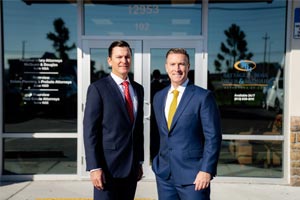
Car accidents can cause delayed symptoms that can appear hours, days, or weeks later. These hidden symptoms can lead to serious health issues if not promptly addressed. This article explores common delayed symptoms after car accidents, the reasons for their delayed onset, and stresses the importance of seeking timely medical and legal assistance.
Equipped with this knowledge, readers will better understand these hidden dangers and know when to consult a healthcare provider or a St. Petersburg car accident lawyer.
Understanding Delayed Symptoms from Car Accident Injuries
After being involved in a car accident, many mistakenly believe they’ve escaped unscathed. This misconception often stems from the absence of immediate pain or visible injuries. The rush of adrenaline and endorphins—our body’s natural painkillers—produced during traumatic events can initially mask pain.
When these chemicals recede, discomfort and other symptoms begin to emerge. It’s not uncommon for whiplash victims to start feeling effects 24 to 48 hours after the car accident. At this moment, the true extent of trauma can surface hours or even days later, manifesting as delayed symptoms that could signify serious injuries. Among these, whiplash is one of the most common ailments.
Whiplash: A Common Delayed Symptom
Whiplash is a neck injury caused by rapid, forceful movement of the neck. Car accidents are a common cause of whiplash due to sudden jerking motion.
Symptoms associated with whiplash can vary widely among patients. Some individuals might experience:
- Neck pain and stiffness
- Headaches, most often at the base of the skull
- Dizziness and fatigue
- Blurred vision
- Tinnitus (ringing in the ears)
In more severe cases, cognitive and emotional issues may develop such as memory problems, difficulty concentrating, irritability, and sleep disturbances.
Concussions and Traumatic Brain Injuries (TBIs)
Car accidents can often result in Concussions and Traumatic Brain Injuries (TBIs), two forms of brain-related injuries with the potential for delayed onset symptoms. The sheer force of a collision can cause the brain to move within the skull, leading to bruising, tissue damage, or blood clots that might not be immediately apparent.
Immediate medical evaluation is crucial for suspected concussions, even if delayed symptoms are present. The nature of these injuries means that some symptoms—such as confusion, headaches, dizziness, or changes in sleep patterns—may only become noticeable hours or days after the accident.
In addition to these immediate symptoms, victims may experience longer-term effects like memory problems, mood swings, and difficulty concentrating. These can have a profound impact on a victim’s daily life and ability to work. Hence it becomes critically important to not underestimate the impact of car accidents on brain health.
Spinal Injuries and Other Internal Trauma
Car accidents can result in a variety of serious injuries, many of which may not present symptoms immediately. Particularly, spinal injuries, internal bleeding, or blood clots often exhibit delayed symptoms, making them seriously dangerous conditions if not promptly diagnosed and treated.
Spinal Injuries
Spinal injuries, such as herniated discs or fractures, may initially appear minor or even non-existent due to the adrenaline rush experienced during the accident. Symptoms like pain, numbness, or weakness in the limbs may only develop hours or days after the incident. Therefore, it’s crucial to seek medical attention even if no immediate pain is felt.
Internal Bleeding
Internal bleeding is another injury with potentially life-threatening implications if left untreated. Delayed symptoms can manifest as abdominal pain or swelling, dizziness, deep bruising, or fainting spells. Given the severity of these conditions, immediate medical evaluation is strongly advised following any car accident.
Blood Clots
Blood clots can occur after a car accident, especially if there is vein damage or immobility. Recognizing symptoms like swelling, redness, heat, or pain in the area is crucial. Seek medical help immediately to prevent complications like pulmonary embolism.
The Hidden Impact on Mental Health
Car accidents can cause physical injuries and trigger mental health issues like PTSD.
Understanding Post-Traumatic Stress Disorder (PTSD)
PTSD is a mental health condition that arises from experiencing or witnessing a terrifying event. It can affect anyone involved in a car accident, whether as a driver, passenger, or even as a bystander.
The symptoms of PTSD can be grouped into four main categories:
Intrusion symptoms: This includes intrusive thoughts, nightmares, and flashbacks related to the traumatic incident.
Avoidance behaviors: Individuals actively avoid anything that reminds them of the accident, such as driving or even talking about it.
Negative changes in thinking and mood: This may involve feeling emotionally numb, having negative beliefs about oneself or others, or losing interest in previously enjoyed activities.
Hyperarousal symptoms: People with PTSD often experience heightened levels of anxiety, leading to difficulties sleeping, irritability, and being easily startled.
How Car Accidents Can Trigger PTSD
A car accident can shatter your sense of safety and security in an instant. The suddenness and violence of the crash can leave a lasting impact on your mind, causing you to relive the event constantly through distressing memories or nightmares.
In some cases, these symptoms may not appear immediately after the accident. Initially, you might feel fine due to shock or denial mechanisms. However, as time passes and the reality sinks in, the psychological effects can start to surface.
The Importance of Seeking Help
PTSD isn’t a sign of weakness or something you can easily overcome alone. Without support and treatment, symptoms can persist for months or even years, greatly affecting your daily life and well-being.
If you’ve had a car accident and have any of the mentioned signs, seek professional help. Mental health providers specializing in trauma-related disorders can assist with recovery and offer strategies for managing PTSD.
Your mental health is as important as your physical health. Untreated, the hidden wounds from car accidents can have lasting consequences. Take proactive steps to heal and regain control of your life.
Seeking Help for Hidden Injuries
Car accident injuries may appear later, so it’s crucial to promptly see a doctor, even without immediate pain. Early medical attention improves recovery chances.
Why Immediate Medical Attention Matters
Here are a few reasons why immediate medical attention matters after a car accident:
Early detection of injuries: Some injuries, like whiplash or internal bleeding, may not show symptoms right away. By getting checked out by a doctor, they can identify any hidden injuries that need treatment.
Documentation of injuries: Having medical records right after the accident can strengthen your case if you decide to file a personal injury claim later on.
Insurance coverage: In Florida, Personal Injury Protection (PIP) insurance has a “14-day rule.” According to the 14-day rule, if you are involved in a car accident in Florida and wish to utilize your PIP insurance coverage, you must seek medical treatment within 14 days of the accident. Failure to do so may result in the denial of your PIP claim and coverage.
Where Can I Go For Medical Evaluation?
After a car accident in St. Petersburg, Florida, you have several options for obtaining medical evaluation and treatment:
- Hospital Emergency Room: If you have serious injuries, such as severe pain, bleeding, or head trauma, go to the nearest hospital emergency room for immediate medical care.
- Urgent Care Center: For non-life-threatening injuries that still require prompt attention, you can visit an urgent care center in St. Petersburg. They can provide evaluation, treatment, and diagnostic services for a range of injuries.
- Primary Care Physician: If you have a regular primary care physician, you can schedule an appointment for a post-accident evaluation. They can assess your condition and recommend further treatment if needed.
- Chiropractor or Orthopedist: If you are experiencing musculoskeletal pain or injuries, you may consider seeing a chiropractor or orthopedic specialist for evaluation and treatment.
Make sure to keep detailed records of all medical evaluations, treatments, and expenses related to the accident for insurance and legal purposes.
The Importance of Legal Guidance
In addition to seeking medical help, it’s also crucial to reach out to a personal injury lawyer, especially if you experience delayed symptoms. A skilled attorney can provide valuable support and guidance throughout the process:
Protecting your rights: An attorney will ensure that your legal rights are upheld and that you’re not taken advantage of by insurance companies or other parties involved.
Navigating complex cases: Delayed symptom cases can be challenging to navigate due to the difficulty in proving causation. A personal injury lawyer with experience in these types of cases can help gather evidence and build a strong argument on your behalf.
Understanding time limits: The statute of limitations for personal injury cases in Florida has been reduced from four years to two years as a result of the tort reform bill. This change shortens the time frame for individuals to file a lawsuit seeking compensation for their injuries.
Handling negotiations: If you decide to pursue a settlement, an attorney can handle negotiations with the insurance company to ensure that you receive fair compensation for your injuries.
The Role of a St. Petersburg Car Accident Attorney
Lawyers specializing in personal injury cases provide invaluable assistance in navigating the aftermath of an accident. Here’s how they can help:
Explaining your rights: A lawyer will make sure you understand your legal rights and options, empowering you to make informed decisions about your case.
Dealing with insurance companies: Negotiating with insurance adjusters can be overwhelming, especially if you’re still recovering from your injuries. An attorney can handle these communications on your behalf, protecting your interests.
Gathering evidence: Building a strong case requires collecting evidence such as medical records, accident reports, and witness statements. Your lawyer will take care of this investigative work, ensuring that no crucial details are overlooked.
Representing you in court: If a fair settlement cannot be reached, your attorney can file a lawsuit and represent you in court proceedings. Having a legal advocate by your side can significantly improve your chances of securing a favorable outcome.
Contact Us For a Free Consultation
Understanding the hidden impact of delayed symptoms following a car accident can be overwhelming. Dealing with physical pain, emotional trauma, and legal complexities can add to the stress. That’s where we step in!
Our team of expert St. Petersburg car accident lawyers is ready to provide a free, no-obligation consultation. We take pride in our commitment to helping victims understand their rights and guiding them through the legal process.






















